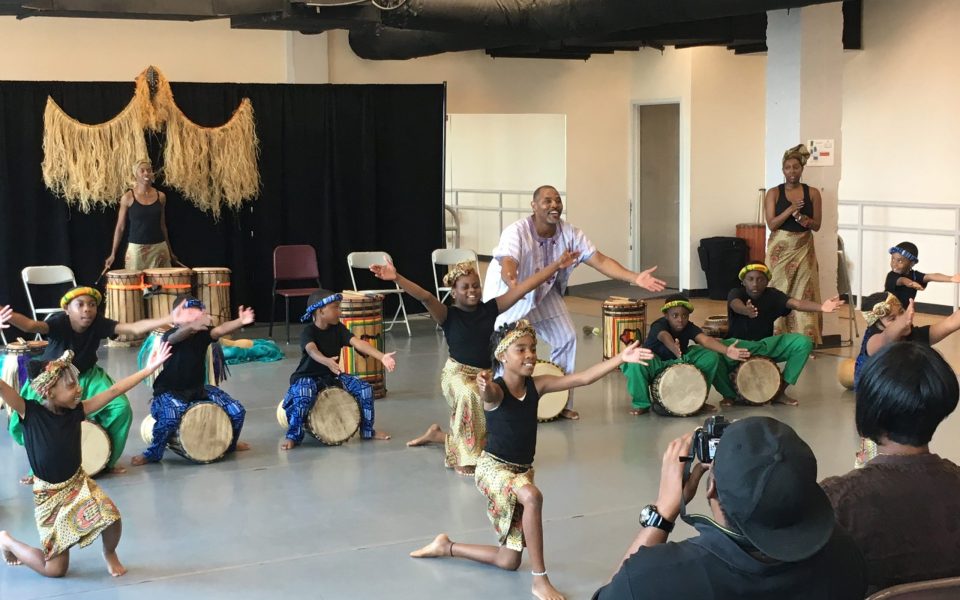Even without a heavy velvet curtain rolling back to reveal the scene, audience members at an African dancing and drumming performance held on July 29th registered visible surprise as a father-and-son duo opened the show with thunderous, intricate beats — the young boy wasn’t older than four.
Gathered at Studio 327 in downtown Greensboro’s Cultural Arts Center, about 50 family, friends and community members absorbed a story scene rendered in dance and music by about a dozen of Wesley Williams’ students. From running triplet steps to an arms-wide-open motif, the dance vocabulary echoed the energy and power inherent to the elemental human story their dance composition sought to tell.
For the past few summers, Williams — who is the founding director of Greensboro’s Suah African Dance Theatre — has worked during his afternoons to teach a four-week, intensive West African dance program to school-age participants at various city-run summer camps. The Dance Project collaborates with Brown Community Recreation Center, as well as other city recreation centers, to mount a grant-funded dance program which the Dance Project hires Williams to the helm.
Williams aimed for the performance to tell “a story about a village in West Africa where it doesn’t rain but once a year.” He related that in West African cultural traditions, villagers “prepare the ground, and when it rains there is a big celebration.” At the July 29 performance, Williams and his group of young dancers endeavored “to tell that story through our bodies, through dance.”

©
By the time this summer’s group of young performers reached their final public show, Williams’ daily mentorship was clearly having an effect. As each young dancer leaped, drummed and chanted in call-and-response with the drums, they displayed confident and jubilant faces. With passionate skill, about a dozen campers from Brown Recreation Center turned out exquisite drum cadences on instruments adorned with colorful cloth bands and fringe.
The performers’ command of intricate dance steps — plus their ability to speak and sing in the Ghanaian language of Twi — rivaled the multitasking required of professional dance and theater company members. Audience members could feel luscious drumbeats vibrating through the floor, and augmented the visually complex dance performance with simple claps of their own.

©
Boys and girls proved their dancerly mettle by twisting into circular and diagonal group formations. The dancers simulated walking, traveling, searching, settling, nodding and waiting for the rain to shower their makeshift village.
Williams’ strong voice accompanied the children’s movements.
“The young people are looking to see if any food is growing!” he exclaimed. “They are digging, I see them scratching. Nothing. What are we going to do? We have no food to eat!”
Three of Williams’ female colleagues, each affiliated with Suah African Dance Theatre, led the young girls in drumstick sequences and movement phrases. Williams directed the boys in showing their dancing prowess and physical strength.
As the narrative dance crescendoed, a full drumming chorus composed of boys, girls and teachers reached full volume, accentuated by claps from the audience. Then — after swift vocal falls and a patter of hands mimicking rain — the children joined in a final jubilant dance that finished in a convivial, open-armed posture.
Anne Morris, co-director of sponsor organization the Dance Project, closed the performance by offering each child, in her words, “a certificate to symbolize how much these kids have accomplished.”
Williams agreed with Morris’ estimation of his students’ growth. But he added that, “dance and drumming is just a vehicle to get to some more important things the children may be dealing with.”
Williams said that the dance camp — which his organization and the city offer to summer camp attendees who may not otherwise learn about West African dancing and drumming — works with a goal of finding and enhancing “individual skills that the kids may not have discovered yet.”
Recalling an anecdote from this summer, Williams said that “one of the young ladies” who participated in the Brown Recreation Center dance camp “was bullied badly as a child.” Williams said that for the first week of camp, “every time I’d ask her to sing, she’d cry, because her peers picked on her for trying to sing. Whenever she’d visit that place inside, she’d get the hiccups. But by the second week, those went away.”

©
Williams attributed that transformation, as well as similar ones he’s witnessed in other children who learn West African fine arts at his camps, to “building the program around the talent we have.”
“All of them have a gift, and we try to find that gift and use it,” he said, “whether it’s poetry, reading, memory, or anything.”
Dance Project is online at www.danceproject.org, while Suah African Dance Theatre has a Facebook page.
Join the First Amendment Society, a membership that goes directly to funding TCB‘s newsroom.
We believe that reporting can save the world.
The TCB First Amendment Society recognizes the vital role of a free, unfettered press with a bundling of local experiences designed to build community, and unique engagements with our newsroom that will help you understand, and shape, local journalism’s critical role in uplifting the people in our cities.
All revenue goes directly into the newsroom as reporters’ salaries and freelance commissions.


Leave a Reply